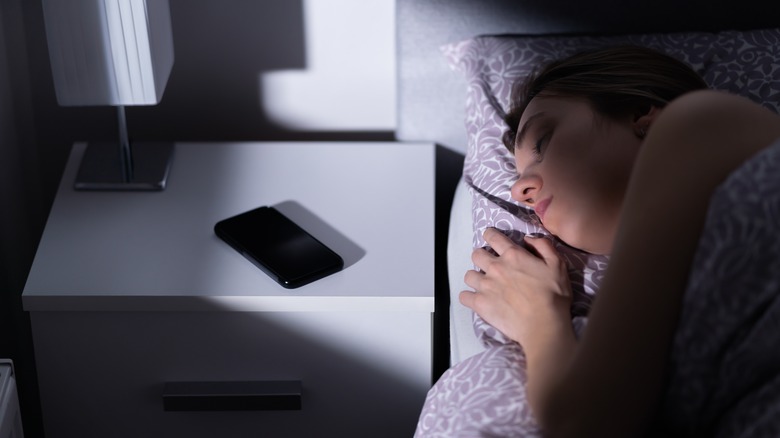10 Nighttime Routines To Fight Off Bad Dreams
Waking up from a bad dream is an incredibly unsettling feeling that keeps many people from easing into peaceful sleep each night. Dreaming is a regular occurrence for most humans, and it's reported by Psychology Today that we dream a total of five to six years of our time on earth!
Each night we cycle into our phase of sleep called rapid eye movement (REM) about four or five times. At the end of REM, as we are coming out of deeper sleep, our brain begins to tell stories that incorporate events or people from stored memories. Harvard Medical School describes dreaming as "recent autobiographical episodes that become woven with past memories to create a new memory that can be referenced later." Sometimes our dreams feature events or people that we don't remember experiencing or meeting while awake, which is what makes dreaming feel so mystical.
Unfortunately, humans also suffer from nightmares, in which the story being told during our dream can feature traumatizing images or scenarios and feel frightening, confusing, or threatening. People who have nightmares can frequently struggle with bouts of insomnia or chronic sleep deprivation to avoid potential bad dreams. The good news is that nightmares are often caused by specific life stressors and the frequency of bad dreams can be reduced through self-care. Consider trying these tips before bedtime to reduce or eliminate nightmares.
Try dream shifting and lucid dreaming
Dreamers can control the outcome of a dream by lucid dreaming or dream shifting. Lucid dreaming is when the dreamer is aware that they are dreaming and can control the trajectory of the dream. This concept is useful for someone who is disturbed by bad dreams and wants to create positive outcomes in the dream state. According to Sleep Foundation, studies have shown that brain patterns during lucid dreaming indicate both wakefulness and sleep state, indicating that lucid dreaming is real and possible to achieve.
MIT Technology Review reports that over half of humans have experienced lucid dreaming, but it's a technique that most of us have to learn to achieve. First, become more aware of all your dreams by journaling each day when you are awake. Next, you must keep the goal of lucid dreaming in your mind as you drift off to sleep. Meditating has been linked to lucid dreaming, so the best technique to drop into a lucid dream is to meditate at the start of sleep with the intention of being aware of your dreams.
Another technique, called shifting, took TikTok by storm in 2020 with the hashtags #realityshifting or #shifting. Grace Warwick, a therapist, explained to i-D that this shifting phenomenon is called a "transliminal experience." During the experience, the individual is awake but fully relaxed and near a state of sleeping, and the dreamlike state is used to enter desired worlds.
Commit to a consistent sleep schedule
Getting sufficient sleep is also an important factor in reducing the possibility of bad dreams. The Centers for Disease Control and Prevention recommends adults ages 18 to 60 get seven or more hours of sleep. Insufficient sleep can cause REM rebound, in which a person experiences longer sleeping bouts or longer cycles of REM when asleep. This rebound can contribute to an increase in vivid dreams and, consequently, more nightmares, according to Sleep Foundation.
The experts at Sleep.com have some tips for improving the consistency of your sleep schedule. Try to stick with a better routine throughout the entire day and use a wind-down routine before bed. Journal your day so that you can track any disruptions or stressors that might be keeping you from a consistent sleep schedule. If you need to move your hours of sleep, do so in 30-minute increments over the course of three to four days.
The CDC also suggests that you resist the urge to stay up late or sleep in on the weekends and try to remain consistent seven days a week to improve the quality of sleep overall. But remember that as long as you are getting sufficient sleep, it doesn't really matter what time of day it is. "If you go to bed consistently at 1 a.m. and wake up at 9 a.m., feeling well-rested, there is no problem," Dr. Carolina Marcus told Sleep.com.
Take care of your mental health
People with mental health conditions like anxiety, depression, post-traumatic stress disorder (PTSD), and bipolar disorder report higher rates of nightmares, according to Sleep Foundation. People with PTSD can relive traumatic memories in bad dreams and worsen the condition, especially if the bad dreams contribute to insomnia. It's helpful to take steps to manage mental health conditions before sleeping in order to avoid bad dreams.
In a study from Journal of Sleep Research, it was reported that thought suppression can contribute to nightmares. Thought suppression is when a person attempts to forget or not think about negative thoughts or occurrences, and it can make negative thoughts worsen or increase in frequency. It's important to take the time to release and process any negative thoughts or experiences that have recently happened to you.
Journaling, meditation, and burning sage are practices that can help a person become mindful and release negative thoughts before bedtime. It may also be helpful to give yourself time to over-analyze a negative thought at an earlier time in the day, which psychologist Patrick Keelan calls "worrying time." Scheduling time earlier in the day to deal with stressors directly may eliminate the negative thoughts that find their way into your dreams at night.
Create a sleep-friendly environment
The importance of a good sleeping environment cannot be underestimated in the quest to eliminate bad dreams. A room that is too warm, lacks air flow, or has distracting light or noise can keep you from falling asleep or staying asleep. Even worse, nightmares are more likely to occur if your sleeping environment is too warm.
Dr. Neil Stanley explained to The Daily Mail that a warm room can cause a person to have less restful sleep. If the cycle of sleeping is disturbed, this can lead to increased brain activity during sleep, which results in more dreams that are more vivid in nature. Dreaming more vividly can spell disaster for someone who has a nightmare. The images from a bad dream may be more easily remembered and more traumatizing.
Dr. Stanley suggests sleeping in a room that is between 61 and 64 degrees Fahrenheit, perhaps with the window open, and to "sleep under natural fibers, cottons, and silks that will keep you cool." According to the CDC, it is also best to use darkening drapes, remove any source of white or blue light, and use earplugs if noise cannot be reduced or eliminated. The idea is to encourage less brain activity while sleeping and allow the body to cool off and cycle through the sleep phases properly.
Limit disturbing content
If you like watching scary movies or listening to true crime podcasts to wind down, this could be impacting the stories that play out in your dreams. Marc L. Benton, a sleep expert, told Courier Post, "To a degree, and this varies from person to person, whatever you are doing or thinking about around the time you go to bed can impact your dream content."
Benton also warned that any use of your phone can cause poor sleep initiation or sleep disruption. Simply scrolling through social media or responding to texts can require enough thought to emotionally stimulate you at a time when you should be decompressing. It's important for your overall health to use the time right before bed for self-care and calming, relaxing activities. "Anything, including disruptive dreams, that reduces your total sleep time, increases anxiety levels, or negatively impacts sleep quality can affect your overall health," warned Benton.
Harvard Medical School reports that any kind of light source can suppress melatonin, the hormone that impacts sleep. Our electronics, like cell phones and televisions, emit blue light that helps keep us alert and awake during the day. Blue light can be twice as disruptive to sleep, so it's best to find ways to wind down that don't involve looking at a screen.
Be mindful of your late-night snacking
If you like grazing in front of the fridge or pantry before bedtime, it might be impacting your ability to recall bad dreams. According to Dr. Stanley, the body functions to cool itself by a few degrees during sleep (via The Daily Mail). Because digestion requires energy, which generates heat, eating before bed can make it difficult for your body to cool off enough to get uninterrupted sleep.
Harvard Medical School confirms that being more wakeful during the night means that vivid dreams, like nightmares, can be more easily recalled. A large dinner heavy in carbohydrates, for example, may cause the body to have periods of wakefulness throughout the night, and traumatizing dreams can be fresh in the memory.
It has been reported anecdotally that certain foods, such as spicy foods, directly contribute to nightmares. Frontiers in Psychology found that about 17.8% of surveyed subjects believe that certain foods impact dreams directly. However, there is no scientific evidence to support this claim, even though popular culture and media continue to circulate the idea. Still, knowing that late-night food will have you waking up more often, it's best to stop eating around two to three hours before bed, according to Rise Science.
Change your sleep position
Sleep position plays a big role in overall health. For example, sleeping on your stomach has been linked to lower back, neck, and shoulder pain. Sleeping on your back can be horrible for sleep apnea. In addition, Journal of Alzheimer's Disease posits that "head position during sleep could affect the efficiency of protein clearance from the brain" and sleeping on the back could be tied to neurodegenerative disease!
There is also scientific evidence to support that your sleep position has an effect on your sleep quality and your dreams. In 2012, Dreaming reported that participants who slept on their stomachs reported disturbing dreams of being locked up, smothered, or unable to move. Results of a study in Sleep and Hypnosis on self-reported sleeping habits showed that individuals who reported sleeping predominantly on the left side also had a significantly higher rate of nightmares (40.9%) compared to only 14.6% rate of bad dreams reported by right-side sleepers.
The studies only showed relationships between sleeping positions and a higher rate of nightmares, and the researchers did not identify sleeping positions as the cause of bad dreams. However, if you suffer from frequent nightmares, it might be worth a try to sleep on your right side to potentially reduce the number of bad dreams.
Cut back on alcohol consumption
Many people like to reach for a glass of wine or cocktail nightcap as a way to wind down for bed. Despite the drowsy effect it may cause, alcohol is actually disruptive to sleep. Alcohol can induce sleepy effects when it is first consumed, but coming down from the effects of alcohol causes wakeful periods. The sleeper is also not able to cycle into REM as effectively.
Neurologist Karen Lee told Forbes that many of her patients also report haunting and evocative dreams after consuming alcohol. Lee explained that this is the result of your brain working to metabolize the alcohol during sleep. "Your body is trying to make sense of what you're experiencing, so if you've become particularly emotional during a night of drinking, those thoughts and emotions can seep into the content of your dreams," said Lee. If you suffer from frequent bad dreams, it's best to reduce alcohol consumption to improve dream quality.
If you are trying to stop drinking altogether, or if you are drastically reducing the amount of alcohol you typically consume, this may also have an impact on sleeping and dreaming. Futures Recovery Healthcare reports that alcohol withdrawals can be the cause of bad dreams, in addition to disrupted sleep or insomnia.
Switch medication doses to morning, when possible
Medications, and the withdrawal of certain medications, can impact the quality of dreams. According to Mayo Clinic, certain medications that treat depression, cardiovascular conditions, Parkinson's, and smoking cessation may cause nightmares. Consult your physician to understand the side effects that may be caused by your medications. Find out if doses taken in the morning may have less of a negative impact on sleep and dream quality.
GoodRx also recommends discussing a melatonin supplement with your doctor to determine if it's safe to use with your current medications. However, experts at Cleveland Clinic point out that people who use melatonin report more vivid dreams, perhaps because the sleeper is having longer periods of REM. There is no evidence to support that melatonin causes bad dreams.
Similar to alcohol withdrawal, coming off certain medications may also be causing bad dreams. According to Sleep Foundation, this is because some medications reduce REM sleep. Once the consumer stops taking the medication, this can cause a REM rebound in which the person has longer REM cycles, resulting in more vivid dreams and possibly disrupted sleep cycles. Talk to your doctor or a sleep specialist if medications are causing bad dreams.
Try imagery rehearsal therapy to change your dreams
If you are having bad dreams so often that it's keeping you from getting consistent sleep, you may have nightmare disorder. According to Mayo Clinic, there is no test for the disorder, so it's important that you document your sleep habits and patterns to determine with your doctor if your bad dreams have turned into a disorder.
There are therapy modalities designed by psychologists, neuroscientists, and sleep experts to help with bad dreams. Imagery rehearsal therapy is one, and exposure, relaxation, and rescripting therapy (ERRT) is another. These are types of cognitive behavioral approaches to reducing the distress of nightmares. These modalities are often used on individuals with nightmares related to PTSD.
These types of modalities allow an individual to rewrite the ending of a bad dream. The journaling and script-writing are done after the person is awake from a dream. Characters and scenarios can be changed to give the dreamer a sense of control over the narrative and the outcome. The new script is then read and processed while awake to minimize the negative emotional effects of the bad dreams. Experts at sleep study programs like the one at The University of Tulsa have developed different modalities for specific conditions, such as ERRT for active military and veterans, or for individuals with bipolar disorder, for example.










